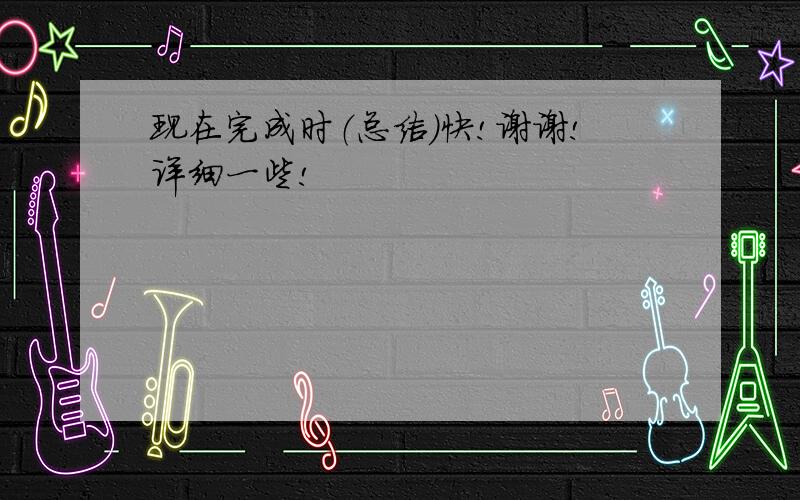现在完成时(总结)快!谢谢!详细一些!
来源:学生作业帮助网 编辑:作业帮 时间:2024/11/25 18:32:37

现在完成时(总结)快!谢谢!详细一些!
现在完成时(总结)
快!谢谢!
详细一些!
现在完成时(总结)快!谢谢!详细一些!
1,现在完成时的构成
肯定式 have / has + 过去分词
否定式 have / has not + 过去分词
疑问式 have / has + 主语+ 过去分词
2现在完成时的用法
① 表示动作发生在过去某个不确定的时间,但对现在留下了某种影响和结果.常被just、already、yet 等副词修饰.如:
-Have you had lunch yet?-Yes,I have.I've just had it.
你(已经)吃午饭了吗?我刚刚吃过.(现在我不饿了)
② 表示从过去某一时刻开始一直持续到现在的动作或状态.这个动 作可能刚停止,可能仍然在进行.常带有for和since等表示一段时间 的状语.
如:He has taught here since 1981
他自1981年就在这儿教书.(可能还要继续教)
I haven’t seen her for four years.
3 现在完成时用法总结
⑴ 与时间状语 so far,till now,up to now,for + 一段时间,before,ever,never,recently,just,already,yet 等时间状语的句子中,谓语常用现在完成时.
I have planted fourteen trees so far.
Have you ever been to Europe before?
I have learned English for three years.
She has not yet studied French well.
⑵ 用在特定句型中
ⅰThis /It is the first /second…/last time (that) …” that 常省略,表示“这是某人第几次做某事” 常常用完成时态.如果主句用一般现在时,从句用现在完成时.主句用一般过去时 ,从句用过去完成时.
It is the third time that I have seen the film.
It is my first time that I have been to Shanghai.
It was the first time I had seen a fantasy film.
ⅱ It is / has been… since… 句型中,主句常用现在完成时,但since从句用一般过去时.
It has been three years since she graduated from Beijing University.
自她北大毕业以来已经三年了.
ⅲThis is one of the most attractive places I’ve been to.被形容词最高级所修饰的名词后的定语从句中,一般用完成时态.
This is the most delicious food I’ve ever eaten.这是我所吃过的最美味的食物.
She is the most beautiful girl I’ve seen.
她是我见过的最美丽的姑娘
⑶ 与时间状语in the past 连用时,谓语常用过去时,而与 in/over/during the past/last +数词+时间名词连用时常用现在完成时.
In the past three years,we have stayed together all the time.
In the past century,soccer has become the most popular sport in the world.
⑷ 也有一些句子无明显的时间状语,也要用现在完成时,此时要根据上下文的意思来判断.
Have you passed your driving test?
4现在完成时与一般过去时的区别
现在完成时的已完成用法很容易与一般过去时相混淆,其区别是:前者强调对现在的影响和结果,后者不强调这个影响和结果,而是强调这个动作发生的时间是在过去:
I’ve lived here for ten years.我在这里住了10年.(现在仍住这儿)
I lived here for ten years.我在这里住过10年.(现在不住这儿了)
He has bought a house.他买了一栋房子.(现在已拥有这房子)
He bought a house ten years ago.他10年前买了一栋房子.(现在是否仍拥有这房子不清楚)
NOTE 注意几点.
1,英语中的动词按照动作发生时间的长短可以分为延续性动词和非延续性动词.前者包括 keep,lie,live,read,sleep,stand,stand,stay,wait,walk,work and so on.后者包括 arrive,begin,borrow,buy,close,come,get to,go ,put,open,reach and so on.
2,现在完成时的句子中,当出现表示 “一段时间” 的状语时,如for three years,in the past three years,since 2005,谓语只能是延续性动词.
She has worked in that factory for five years.
He has lived in Shenzhen since 2002.
3,非延续性动词用于现在完成时,表示动作已经完成.它不能跟段时间.但它的否定式可以跟段时间状语连用.
Tom has left Beijing for Guangzhou.
He has borrowed a pen from me .
Tom hasn’t left Beijing since he came to this city in 2004.
They haven’t bought any new furniture since they moved to Shanghai.
4,have been(to)与have gone( to)的区别:have been(to)表示“去过某地(现在已经回来了)”,可用于各人称;have gone(to)表示“去某地了(说话时某人不在当地)”,常用于第三人称,前者可与once ,never,several times等连用,后者则不能.
如:They have been to Beijing twice.他们去过北京两次.
He has gone to Beijing.他去北京了.
5,如单纯表示一段时间,或强调一段时间,虽有since一词,也不必用完成时.
如:It is two years since his father died.
=His father has been dead for two years.他父亲去世已有三年了.